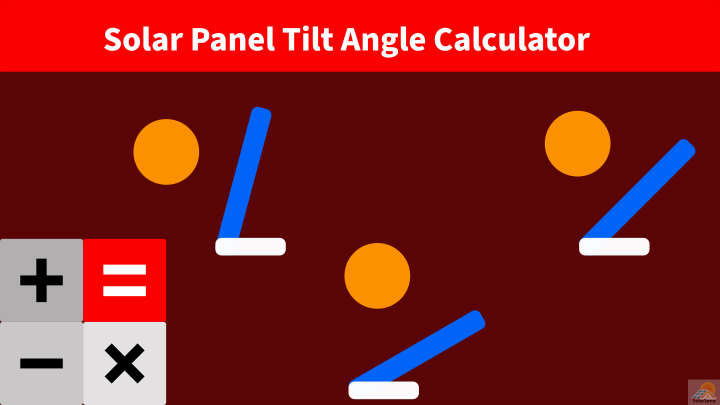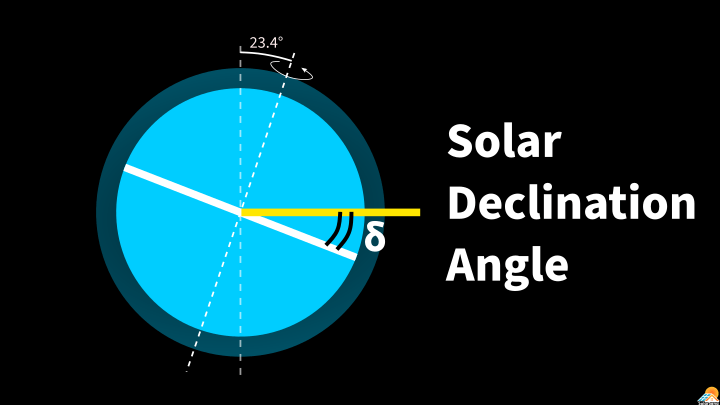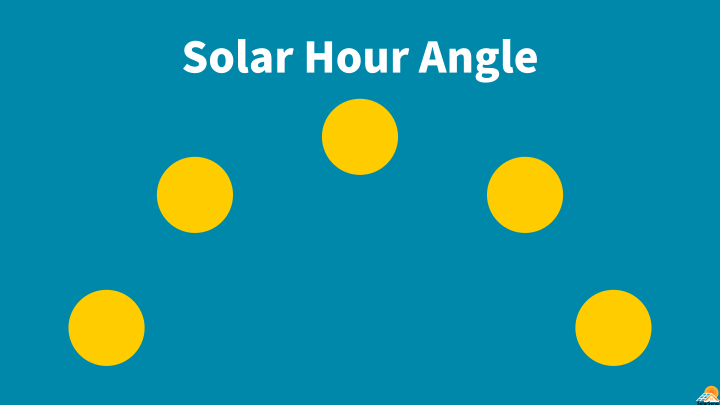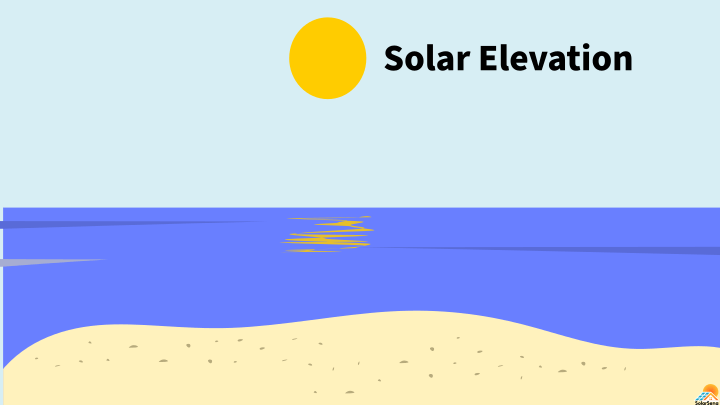The tilt angle is crucial in maximizing solar power from your solar panels. Inclining solar panels at the optimum angle will definitely increase the total power generation. You can use the below calculator to find the best tilt angle for your location.
Solar panel tilt angle calculator
Select your timezone and enter your coordinates (latitude and longitude) to calculate the optimal tilt angle for fixed solar panels, twice adjusted solar panels, quarterly (seasonally) adjusted solar panels, and monthly adjusted solar panels.
You can find your coordinates from Google Search.
The calculator finds the optimum tilt angles for all four possible scenarios (fixed, twice adjustable, seasonally adjustable, and monthly adjustable). And they are displayed in the following four tables.
| Months | Optimal tilt angle |
|---|---|
| Entire year |
| Months | Optimal tilt angle |
|---|---|
| March to August | |
| September to February |
| Months | Optimal tilt angle | Northern hemisphere | Southern hemisphere |
|---|---|---|---|
| March to May | Spring | Fall | |
| June to August | Summer | Winter | |
| September to November | Fall | Spring | |
| December to February | Winter | Summer |
| Months | Optimal tilt angle |
|---|---|
| January | |
| February | |
| March | |
| April | |
| May | |
| June | |
| July | |
| August | |
| September | |
| October | |
| November | |
| December |
What is the tilt angle of solar panels?
The tilt angle of solar panels is the angle made by solar panels with the ground surface. It is denoted by the symbol t. The angle is always positive and between 0° and 90°. When solar panels are completely flat, the angle is 0°, whereas the angle is 90° when panels are perfectly vertical, perpendicular to the ground.

Calculating the inclination (or tilt) angle of solar panels is a vital aspect of photovoltaic design. The tilt angle of solar panels must be such that solar panels receive maximum solar energy. It happens when solar panels are angled perpendicular to the incoming sun’s rays. In simple words, you should place your solar panels right in front of the sun in the sky.
The tilt angle is one of the two factors for calculating the optimal orientation for solar panels. The other is the direction of solar panels.
What is the optimum tilt angle?
As mentioned earlier, we must always face panels in front of the sun to maximize solar power. However, this is not as easy as it seems. The position of the sun in the sky keeps changing every hour and every month. It is practically impossible for us to always keep solar panels facing the sun. For example, the sun will be in the east in the morning, overhead at noon, and in the west in the evening.
So, at what tilt angle panels must be placed? That is where the concept of the optimum tilt angle arises. The optimum tilt angle is the angle at which solar panels will receive the overall maximum solar radiation over a certain period. Instead of tracking the sun every hour or month, we fix solar panels at the optimum position for a particular period.
There are four ways to do that, and they are discussed below.
Optimum tilt angle for fixed solar panels
This is the most common and convenient option. You mount your solar panels permanently, once and for all, with no adjustments.
For fixed panels, the optimum tilt angle equals the latitude of the location. For example, the latitude of San Diego is 32.7° N, so the optimum tilt angle approximately equals to 33°. It will be a permanent one-time fixed angle.

Optimum tilt angles for twice adjusted solar panels
For twice adjusted solar panels, the first half-year is from March to August, and the second is from September to February. Assuming the northern hemisphere, March to August includes all the months of summer, while September to February covers the entire winter.
In the former half of the year, the sun will be at higher altitudes, over our heads. Thus, solar panels must be positioned nearly horizontally. In other words, panels must be angles at a lower tilt angle. For example, the optimum tilt angle in San Francisco (37.7° N, 122.4° W) between March to August, as per the calculator, is 16°.
In the latter half of the year, the sun will be near the horizon, in the southern sky, The solar elevation angle will be small, and we have to face solar panels almost vertical, i.e., at a higher tilt angle. For example, the optimum tilt angle in San Francisco is 59°.
| Months | Optimum tilt angle |
|---|---|
| March to August | 16° |
| September to February | 59° |
The reverse is true for the southern hemisphere.
Optimum tilt angles for quarterly adjusted solar panels
Many times, people are not quite happy with fixed-install solar panels or twice adjusted solar panels. They want to further maximize power production. We can achieve this by adjusting solar panels according to seasons.
There are four seasons: spring, summer, fall, and winter. The Months for them will vary depending upon your location—see table below.
| Months | Northern hemisphere | Southern hemisphere |
|---|---|---|
| March to May | Spring | Fall |
| June to August | Summer | Winter |
| September to November | Fall | Spring |
| December to February | Winter | Summer |
In summer, the sun is overhead, so the tilt angle is small, while in winter, the sun is lower in the sky, so panels are tilted vertically.
The table shows the optimum tilt angles in Denver, Colorado (39.73° N, 104.99° W).
| Months | Optimal tilt angle |
|---|---|
| March to May | 30° |
| June to August | 18° |
| September to November | 49° |
| December to February | 61° |
As we see, June to August are the summer months; the tilt angle is the lowest of all. In winter, the angle is the highest, at around 61°. For the other two seasons, the angles are in-between.

Optimum tilt angles for monthly adjusted solar panels
Optimizing solar power by adjusting solar panels every month will feel the most laborious, and I would not recommend it. However, if you desperately need more solar power, then considering monthly adjustments to PV panels might be beneficial.
The calculator above allows us to calculate the optimum tilt angle for every month of the year.
The table below gives the angles in Houston, Texas (29.76° N, 95.36° W).
| Months | Optimal tilt angle |
|---|---|
| January | 51° |
| February | 44° |
| March | 33° |
| April | 20° |
| May | 12° |
| June | 8° |
| July | 10° |
| August | 17° |
| September | 27° |
| October | 38° |
| November | 48° |
| December | 53° |
From the preceding table, the tilt angle decreases from winter to summer and increases from winter to summer.





Hey Paul,
You will have to change the time zone twice for the calculator to work. I will try to fix this bug. Thank you for letting me know.
Regards,
Bosan
I put in my time zone and lat / long, there is no way to get the calculator to work.